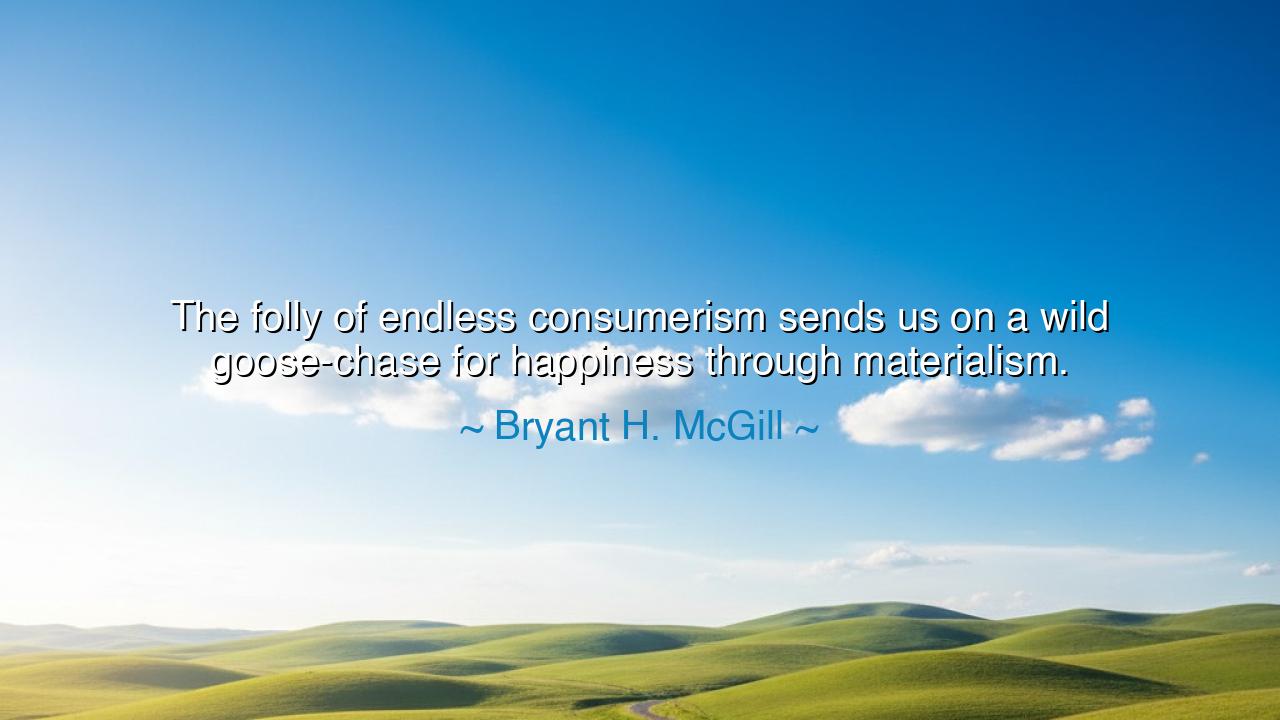
The folly of endless consumerism sends us on a wild goose-chase
The folly of endless consumerism sends us on a wild goose-chase for happiness through materialism.






“The folly of endless consumerism sends us on a wild goose-chase for happiness through materialism.” Thus spoke Bryant H. McGill, a voice of conscience in an age intoxicated by abundance. His words strike like a bell in the hollow corridors of modern life, where men and women chase glittering illusions believing them to be gold. In this saying lies a warning as ancient as it is urgent — that true happiness cannot be bought, and that the endless pursuit of possessions leads not to fulfillment, but to emptiness. McGill reminds us that man, in his blindness, has traded the wealth of the soul for the trinkets of the marketplace, and in doing so, has forgotten that joy cannot be manufactured, only awakened.
The origin of this wisdom is rooted in McGill’s lifelong reflections on the human condition, as expressed in his works on peace, mindfulness, and compassion. Living in an era defined by consumption, he saw how people were taught to equate worth with ownership, to measure success by the size of their homes and the shine of their machines. Yet, the more they possessed, the less they were satisfied. The folly of endless consumerism, as he calls it, is the tragedy of believing that what we can hold in our hands can fill the hunger of the heart. It is a wild goose-chase, a restless wandering through the aisles of the world, where every purchase promises happiness but delivers only a moment’s distraction before desire begins again.
To understand this truth, we need only look to the story of King Midas, that ancient ruler whose wish turned every touch to gold. At first, he rejoiced — for he had everything man could desire. But soon, the gold that surrounded him became a prison; the food he touched turned lifeless, the embrace of his daughter turned to stone. In his greed, he learned the final lesson of materialism — that abundance without wisdom becomes sorrow. His hunger for more blinded him to the riches already within his grasp: love, life, and the warmth of human connection. McGill’s warning is but a modern echo of Midas’s fate — a reminder that when we worship possessions, we lose our humanity.
The wild goose-chase for happiness that McGill describes is the story of modern civilization. We are surrounded by noise — advertisements promising joy through ownership, industries built upon dissatisfaction, and a culture that whispers, “You are not enough — but this product will make you whole.” And so, the people run — from one desire to the next, from one purchase to another — yet the promised happiness remains ever just beyond reach, like a mirage in the desert. The more we consume, the emptier we feel. For what we truly seek is not in the storehouse or the bank account, but in the quiet corners of the heart.
But McGill’s message is not despair — it is awakening. He does not condemn comfort or prosperity, but the idolatry of them. Material things are tools, not masters; they are meant to serve life, not define it. When we cease to chase happiness through possession, we begin to rediscover the sources of real joy — gratitude, love, service, and presence. A man who owns little but sees beauty in the dawn is richer than one who owns palaces yet cannot rest his spirit. The wise man learns that simplicity is not poverty; it is freedom.
History bears witness to this truth in the life of Mahatma Gandhi, who renounced wealth and power to live among the poor, yet became one of the most fulfilled souls to walk the earth. Clad in simple cloth, he possessed nothing, yet inspired millions. His joy was not born from consumption, but from contentment — from alignment with truth and service to others. Gandhi proved that peace is not found in accumulation, but in liberation — liberation from the endless craving that enslaves the mind.
And so, dear seeker, let this wisdom take root within you: do not chase happiness, cultivate it. Look not outward to the marketplace for meaning, but inward to the soul. Practice gratitude each day for what is already yours. When you desire something, ask yourself whether it will enrich your spirit or merely distract your heart. Walk gently upon the earth; seek to possess less and to love more. In giving, in sharing, in stillness, you will find the wealth that neither rust nor time can take away.
For as Bryant McGill reminds us, the folly of endless consumerism is the forgetting of who we are — spiritual beings trying to fill the infinite with the finite. The cure lies not in denial, but in remembrance: that joy is not a commodity to be bought, but a flame to be kindled within. When you cease to chase, you will find that happiness was never running away from you — it was walking beside you all along, waiting for you to see it.






AAdministratorAdministrator
Welcome, honored guests. Please leave a comment, we will respond soon